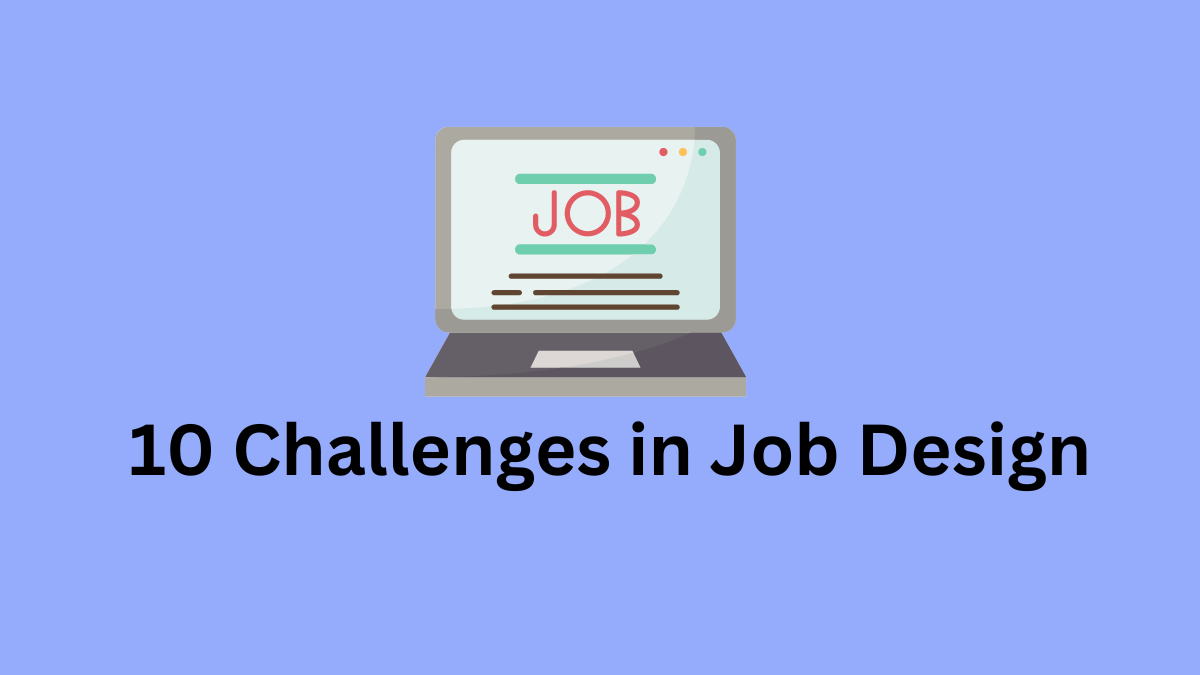Challenges in Job Design
Job design is a multifaceted process that involves structuring job-related tasks and responsibilities to optimize productivity and employee satisfaction. In this article, we will explore 10 common challenges in job design and strategies to overcome them.
Work Overload
Challenge: Work overload is one of the major challenges in job design. Assigning an employee too many tasks or responsibilities can lead to work overload, causing stress and decreased productivity.
Strategy: Implement workload assessments to ensure tasks are distributed evenly. Utilize job rotation or job enlargement to provide variety and alleviate excessive workload.
Work Underload
Challenge: Conversely, assigning too few tasks can result in work underload, leading to boredom and decreased motivation.
Strategy: Utilize job enrichment to provide employees with additional responsibilities and opportunities for skill development. Offer training and development programs to enhance competencies and engagement.
Repetitiveness
Challenge: Monotonous, repetitive tasks can lead to employee dissatisfaction and reduced productivity over time.
Strategy: Introduce job rotation to vary tasks and responsibilities, preventing monotony and promoting skill development. Implement automation or technology to streamline repetitive tasks.
Limited Control Over Work
Challenge: Employees may feel disempowered if they have limited control over their work processes or decision-making.
Strategy: Foster a culture of autonomy and empowerment by involving employees in decision-making processes and soliciting their input on job design. Provide opportunities for self-directed work and goal-setting.
Isolation (for Remote Workers)
Challenge: Remote workers may experience feelings of isolation and disconnection from the team, impacting collaboration and morale.
Strategy: Facilitate virtual team meetings, brainstorming sessions, and social activities to maintain connection and foster a sense of belonging. Utilize collaboration tools and communication platforms to facilitate seamless interaction among remote team members.
Read More: 10 Challenges in Decision Making
Shiftwork Challenges
Challenge: Shiftwork arrangements can disrupt circadian rhythms and lead to fatigue, impacting employee health and performance.
Strategy: Implement ergonomic workstations and lighting solutions to mitigate the effects of shiftwork. Provide adequate rest breaks and promote healthy lifestyle habits among workers.
Delays in Filling Vacant Positions
Challenge: Vacant positions can disrupt workflow and increase workload for existing employees, leading to burnout and decreased morale.
Read More: 10 Challenges in Planning in Management
Strategy: Develop a proactive recruitment strategy to minimize delays in filling vacant positions. Cross-train employees to handle multiple tasks and responsibilities, ensuring continuity in operations.
Excessive Working Hours
Challenge: Long working hours can lead to fatigue, stress, and decreased productivity among employees.
Strategy: Implement policies and guidelines to promote work-life balance, such as flexible work schedules, telecommuting options, and mandatory rest periods. Encourage time management and prioritize tasks to optimize efficiency.
Limited Understanding of the Whole Job Process
Challenge: Employees may lack a comprehensive understanding of their role within the broader context of the organization, leading to inefficiencies and misalignment.
Read More: 10 Challenges in Social Responsibility
Strategy: Provide job training and orientation programs to familiarize employees with the job process and their roles. Foster cross-functional collaboration and communication to enhance understanding of interdepartmental workflows.
Resistance to Change
Challenge: Employees may resist changes to job design, fearing disruption or loss of familiarity.
Strategy: Implement change management strategies, such as clear communication, employee involvement, and gradual implementation, to minimize resistance and facilitate smooth transitions. Highlight the benefits of job design changes, such as increased efficiency, skill development, and career growth opportunities.
Hence, these are the 10 challenges in job design and strategies to overcome them.
Read Next: 10 Challenges in Participative Management
